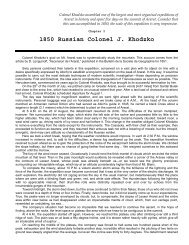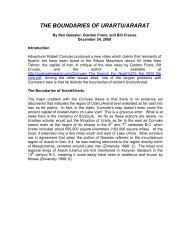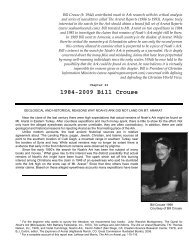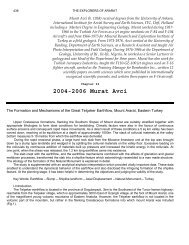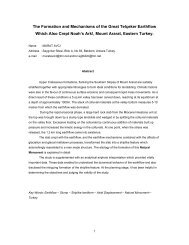1876 British Viscount & Ambassador James Bryce - Noah's Ark Search
1876 British Viscount & Ambassador James Bryce - Noah's Ark Search
1876 British Viscount & Ambassador James Bryce - Noah's Ark Search
You also want an ePaper? Increase the reach of your titles
YUMPU automatically turns print PDFs into web optimized ePapers that Google loves.
178 THE EXPLORERS OF ARARAT<br />
Only yesterday somebody coming this way from Tiflis had seen one or two armed horsemen peering round a<br />
hillside, and had escaped them only by galloping to the station, which luckily was near. After this, it was urged by the<br />
postmaster, to go on at night would be downright folly. Such is the perversity of human nature that the more these<br />
stories were told, the less we believed them; and probably we should have disbelieved them altogether could the usual<br />
innkeeper’s motive have been discovered. The same stories reappeared; the same advice was even more solemnly<br />
tendered. However, it was now near midnight, Tiflis was only two hours away, and our impatience to rest in a civilized<br />
bed instead of on a post-house floor made us ready to face dangers more substantial than these seemed to be. “No,”<br />
we answered; “you may say what you like, but we shall go on; tonight shall see us either murdered or in Tiflis. But if it<br />
is any satisfaction to you, or protection to us, give us two or three tchapars to ride beside the tarantass.” To this the<br />
postmaster demurred, and, after beating about the bush for a good while, at last muttered, “We are more afraid of our<br />
own people for you than of the Tatars.” After this there was no more to be said; we called for horses, and drove off<br />
alone, amid many warnings, first that we would be brought back stripped and wounded, and, secondly, that even if we<br />
escaped the band, some stray marauder would certainly climb on to the carriage as we entered Tiflis, and cut away the<br />
portmanteau which was tied behind. Nothing, however, happened, except that once or twice in the darkness, for it was<br />
as black as a wolf’s mouth, with thunderstorms growling in the distance, we ran into Tatar carts making for the city, and<br />
were nearly capsized. At 2 AM we entered Tiflis.<br />
Desiring to see something of the coast of Asia Minor, and especially of Batum and Trebizond, we chose the route<br />
by Poti, and on the 22nd of September took our seats in the train for the Black Sea. After a good many miles of this<br />
narrow glen, the hills recede a little, and the town of Gori appears lying in a small plain at the foot of a castellated rock,<br />
where a broad shallow stream comes down from the Caucasus to mingle its sparkling waters with the muddy Kur.<br />
From the top of the rock, nearly 200 feet above this plain, there is a magnificent view over the Caucasus to the north,<br />
most of the great peaks between Elbruz and Kazbek being visible. At 6:30 AM next morning we started in our host’s<br />
company for the place we had halted at Gori to see, the Petra of the Caucasus, the rock-city of Uphlis Tzikhé. They led<br />
us up the face of the crags by a steep winding path, partly built up of stones, partly cut out of the cliff, to the top, where<br />
we found ourselves suddenly in the midst of the city, a city with streets, palaces, shops, private houses, all hewn in the<br />
solid rock without a fragment of masonry or a piece of timber anywhere through it. The people who lived here were no<br />
mere brutish troglodytes, but a cultivated race.<br />
Returning to Gori, we took the mid-day train, the same, which had brought us from Tiflis yesterday, for the west.<br />
We had very nearly missed it, for the ticket for the luggage we had left at the station had been lost. An appeal to let us<br />
have the goods despite the want of the ticket would have failed in France or Germany; but with these good-natured<br />
people it ultimately succeeded, and they even kept the train, the one train of the day, full of officers and troops, waiting<br />
for fifteen minutes while this difficulty of ours was adjusted; an instance of indulgence to unpopular England which a<br />
little surprised us. We tried to read, but were too stupid to keep awake, and fell into a slumber broken by hideous<br />
dreams. About midnight the lagging train crawled at last into the terminus at Poti, and we drove, under the blackest<br />
night I can remember, across the wooden bridge, through seas of mud, to the miserable inn of the most miserable<br />
town that ever a traveler was condemned to halt in. Better a hungry bivouac under the snows of Ararat than those<br />
dank bedrooms and clammy sheets, heavy with such a smell of putrid slime that one feared to lift the frowsy carpet<br />
and find beneath it a bottomless abyss of foulness. The steamers, which run from Poti to Constantinople and Odessa,<br />
leave only once a week. So at last we settled down to the conclusion that, if the bar continued impracticable tomorrow,<br />
there was nothing for it but to retrace our steps to Tiflis, and go home over the Dariel Pass, and by railway from<br />
Vladikavkaz to Odessa, a circuit of about eleven hundred miles. This seemed too absurd to be true.<br />
Chapter X<br />
Except a few turbaned Ottomans, all, both Christians and Turks, wear the red fez, and the poorer ones their<br />
brilliant crimson sash, with more or less of picturesque variety in jackets. Nothing strikes a Westerner with more<br />
disgust than the way he sees women treated in Mohammedan countries. It is not so much the enforced seclusion that<br />
revolts you as the tacit assumption that women are inferior creatures altogether, unfit to be companions for men.<br />
Constantinople is one of the few places in the world, which surpasses all expectations. It is more beautiful, more<br />
unique, more commanding than any description has prepared you to find it. As everybody knows, it consists of three<br />
parts: firstly, Stamboul [Istanbul] proper, the city of Constantine, standing on the site of old Byzantium between the Sea<br />
of Marmara and the Golden Horn (a long narrow inlet off the Bosphorus); secondly, Galata, a town which grew up in<br />
the later middle ages, also in Europe, but on the opposite or northeast side of the Golden Horn, and Pera, an<br />
extension of Galata up the steep hill which rises behind it; and finally, on the other or Asiatic side of the Bosphorus, the<br />
towns of Scutari and Kadikeui (Chalcedon), with their far-stretching suburbs. If ever a war is undertaken on behalf of<br />
Constantinople, let us understand that is not for the sake of the Turks, but for aesthetic reasons only: to preserve the<br />
loveliness of a city that is unique in the world and could never be replaced.<br />
In these circumstances not only war, but conquest also, is obviously against Russia’s interest. All this is, of<br />
course, perfectly well known and foreseen by intelligent Russians, who cannot understand why foreigners should not<br />
credit them with perceiving what is so obvious. It is felt most strongly by the Emperor and his advisers, on whom a



